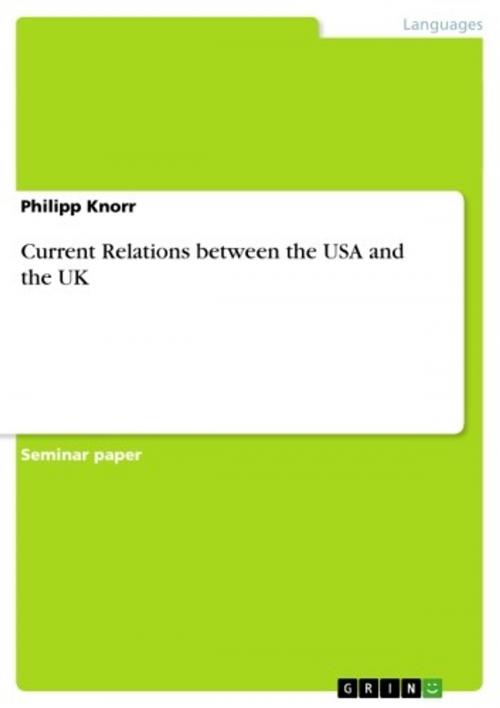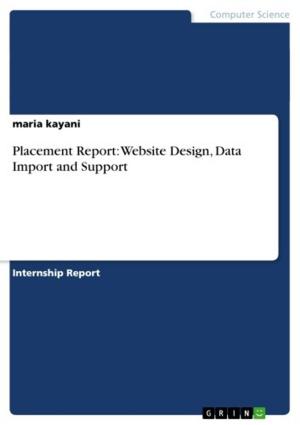Current Relations between the USA and the UK
Nonfiction, Reference & Language, Study Aids, ESL, Foreign Languages| Author: | Philipp Knorr | ISBN: | 9783638139564 |
| Publisher: | GRIN Publishing | Publication: | August 26, 2002 |
| Imprint: | GRIN Publishing | Language: | English |
| Author: | Philipp Knorr |
| ISBN: | 9783638139564 |
| Publisher: | GRIN Publishing |
| Publication: | August 26, 2002 |
| Imprint: | GRIN Publishing |
| Language: | English |
Seminar paper from the year 2002 in the subject English - Applied Geography, grade: 1,7 (A-), University of Bayreuth (English), course: Applied Geography: The American Social Landscape, 11 entries in the bibliography, language: English, abstract: The relations between two important countries, such as the United Kingdom and the United States, have always been interesting to watch for people strongly interested in foreign politics and international interaction. But since September 11th 2001 this has changed completely; with the assaults of the al-Qaeda terrorists on the Pentagon and the World Trade Center, it has been proven that terrorist attacks can happen any where in the world. Hence everybody should be interested in what the leaders of the international alliance against terrorism are doing or planning to do. The leader of the alliance are of course the USA, simply because the attacks happened in their country and it is undoubted that they are still the only world power. But Great Britain is also heavily involved in the 'war against terrorism'1, not only because of the death of many Britons in the WTC or because NATO invoked Article 5 ('an attack on one member state is an attack on all'2), but because of a strong multitude of cultural and historical bonds with the United States. Great Britain and the USA are often said to have a 'special relationship', so to analyze this relationship in its current form, I am going to first describe Tony Blair's personal role in the partnership with the USA and thus with George W. Bush. This includes why he and G. W. Bush are working together so well although their characters and social backgrounds are very different, and an overview of the different ways Tony Blair's role in the alliance against terror is seen in the world. Afterwards I am going to illustrate Great Britain's role as a bridge between the United States and continental Europe. Obviously this will not be possible without describing Great Britain's general role in the EU and again mentioning Premier Minister Tony Blair, but in this section his actions represent Great Britain as a nation and himself. Nearly every European country and many countries all over the world are supporting the war on terror, partly because of NATO Article 5, but primarily because they think it is the only way to stop terrorism. But most of the European leaders do not share Bush's view of the 'axis of evil' consisting of Iran, Iraq and North Korea, expressed in his state-of-the-union address in January 2002. In the next section I will show that this causes problems for Great Britain and Tony Blair because there will probably be no world alliance for military action against Iraq. [...]
Seminar paper from the year 2002 in the subject English - Applied Geography, grade: 1,7 (A-), University of Bayreuth (English), course: Applied Geography: The American Social Landscape, 11 entries in the bibliography, language: English, abstract: The relations between two important countries, such as the United Kingdom and the United States, have always been interesting to watch for people strongly interested in foreign politics and international interaction. But since September 11th 2001 this has changed completely; with the assaults of the al-Qaeda terrorists on the Pentagon and the World Trade Center, it has been proven that terrorist attacks can happen any where in the world. Hence everybody should be interested in what the leaders of the international alliance against terrorism are doing or planning to do. The leader of the alliance are of course the USA, simply because the attacks happened in their country and it is undoubted that they are still the only world power. But Great Britain is also heavily involved in the 'war against terrorism'1, not only because of the death of many Britons in the WTC or because NATO invoked Article 5 ('an attack on one member state is an attack on all'2), but because of a strong multitude of cultural and historical bonds with the United States. Great Britain and the USA are often said to have a 'special relationship', so to analyze this relationship in its current form, I am going to first describe Tony Blair's personal role in the partnership with the USA and thus with George W. Bush. This includes why he and G. W. Bush are working together so well although their characters and social backgrounds are very different, and an overview of the different ways Tony Blair's role in the alliance against terror is seen in the world. Afterwards I am going to illustrate Great Britain's role as a bridge between the United States and continental Europe. Obviously this will not be possible without describing Great Britain's general role in the EU and again mentioning Premier Minister Tony Blair, but in this section his actions represent Great Britain as a nation and himself. Nearly every European country and many countries all over the world are supporting the war on terror, partly because of NATO Article 5, but primarily because they think it is the only way to stop terrorism. But most of the European leaders do not share Bush's view of the 'axis of evil' consisting of Iran, Iraq and North Korea, expressed in his state-of-the-union address in January 2002. In the next section I will show that this causes problems for Great Britain and Tony Blair because there will probably be no world alliance for military action against Iraq. [...]















